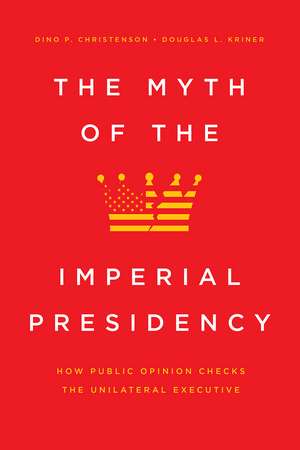The Myth of the Imperial Presidency: How Public Opinion Checks the Unilateral Executive
Autor Dino P. Christenson, Douglas L. Krineren Limba Engleză Paperback – 13 iul 2020
With robust empirical data and compelling case studies, the authors reveal the extent to which domestic public opinion limits executive might. Presidents are emboldened to pursue their own agendas when they enjoy strong public support, and constrained when they don’t, since unilateral action risks inciting political pushback, jeopardizing future initiatives, and further eroding their political capital. Although few Americans instinctively recoil against unilateralism, Congress and the courts can sway the public’s view via their criticism of unilateral policies. Thus, other branches can still check the executive branch through political means. As long as presidents are concerned with public opinion, Christenson and Kriner contend that fears of an imperial presidency are overblown.
| Toate formatele și edițiile | Preț | Express |
|---|---|---|
| Paperback (1) | 241.26 lei 6-8 săpt. | |
| University of Chicago Press – 13 iul 2020 | 241.26 lei 6-8 săpt. | |
| Hardback (1) | 572.82 lei 6-8 săpt. | |
| University of Chicago Press – 23 noi 2020 | 572.82 lei 6-8 săpt. |
Preț: 241.26 lei
Nou
Puncte Express: 362
Preț estimativ în valută:
46.17€ • 47.70$ • 38.43£
46.17€ • 47.70$ • 38.43£
Carte tipărită la comandă
Livrare economică 25 martie-08 aprilie
Preluare comenzi: 021 569.72.76
Specificații
ISBN-13: 9780226704364
ISBN-10: 022670436X
Pagini: 240
Ilustrații: 37 line drawings, 23 tables
Dimensiuni: 152 x 229 x 20 mm
Greutate: 0.4 kg
Ediția:First Edition
Editura: University of Chicago Press
Colecția University of Chicago Press
ISBN-10: 022670436X
Pagini: 240
Ilustrații: 37 line drawings, 23 tables
Dimensiuni: 152 x 229 x 20 mm
Greutate: 0.4 kg
Ediția:First Edition
Editura: University of Chicago Press
Colecția University of Chicago Press
Notă biografică
Dino P. Christenson is associate professor in the Department of Political Science at Boston University and an institute fellow at the Hariri Institute for Computational Science and Engineering. He is a coauthor of Applied Social Science Methodology. Douglas L. Kriner is the Clinton Rossiter Professor in American Institutions in the Department of Government at Cornell University. He is the author of multiple books, including After the Rubicon, also published by the University of Chicago Press.
Cuprins
Chapter 1: An Imperial Presidency?
Chapter 2: How Americans Think about Unilateral Action
Chapter 3: Congressional Pushback in the Public Sphere
Chapter 4: Rethinking the Role of the Courts
Chapter 5: A Popular Check on Unilateralism
Chapter 6: Pathways of Political Constraint
Chapter 7: Democratic Decline?
Chapter 2: How Americans Think about Unilateral Action
Appendix to Chapter 2
Chapter 3: Congressional Pushback in the Public Sphere
Appendix to Chapter 3
Chapter 4: Rethinking the Role of the Courts
Appendix to Chapter 4
Chapter 5: A Popular Check on Unilateralism
Appendix to Chapter 5
Chapter 6: Pathways of Political Constraint
Chapter 7: Democratic Decline?
Notes
References
Index
References
Index
Recenzii
“If unilateralism is so tempting and so effective, Christenson and Kriner ask, why is it so rare? The key dynamics, they show, are less in other branches of government but in politics and public opinion. Christenson and Kriner unify strands of presidency research that have been treated by too many as competitors and even as opposites, and the book will make a crucial contribution.”
“American democracy only works if the populace controls those who they elect. There is no more fundamental question then whether citizens can in fact exert such control. Yet, for more than one hundred years, scholars and pundits have worried about an imperial presidency that evades institutional and popular checks. This seminal book offers remarkable evidence that the public—with the help of the Congress and the courts—do in fact hold the president accountable. In that sense, democracy can work and has worked. Alas, the book also points to concerns of responsiveness to a narrow base. In so doing, Christenson and Kriner not only resolve a hundred-year-old puzzle but also set an agenda for the next generation of scholarship on American democracy.”
